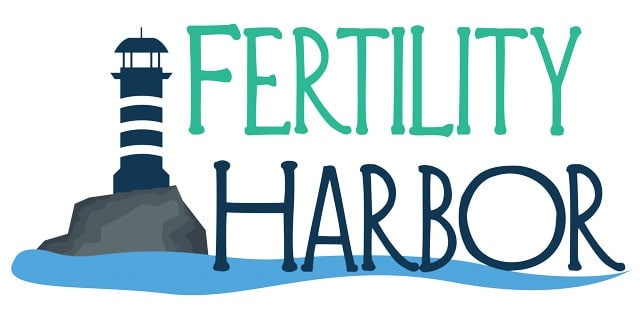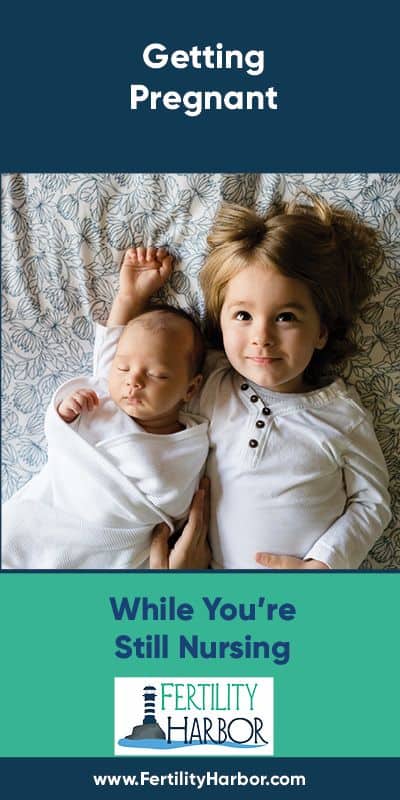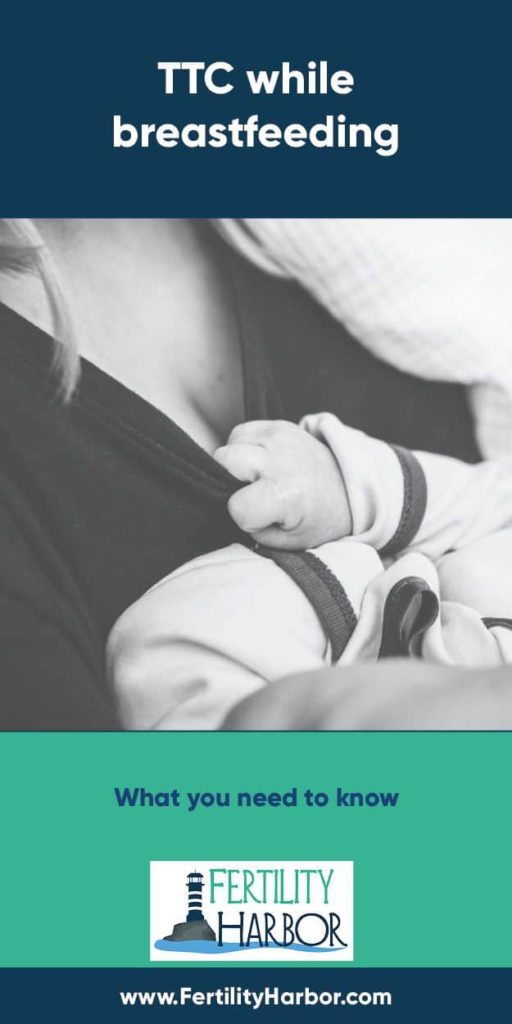This post was reviewed for medical accuracy by Rosalie Gunson, a Certified Registered Nurse Practitioner specializing in fertility care.
Our bodies are designed to provide some natural spacing between children. That makes sense — pregnancy, childbirth, and caring for a newborn are hard work, and doing it all back-to-back is even harder.
But what if you conceived your first child with the help of fertility interventions, and you want to get pregnant again as soon as possible?
Can you do another round of fertility treatment while still breastfeeding your baby? The short answer is maybe, but probably not.
You will need to get your cycle back before you can conceive again, and breastfeeding can produce hormones that prevent your body from ovulating or creating a good environment for implantation.
In addition, many fertility drugs have not been thoroughly tested on nursing or pregnant women. If you’re seeing a reproductive endocrinologist (RE), they’ll probably tell you that you have to stop breastfeeding before starting fertility treatment.
Getting Your Cycle Back After Childbirth
After spending your pregnancy period-free, you will naturally wonder when you will start getting visits from Aunt Flo again. Women who are hoping to get pregnant again very soon will definitely have to pay attention to this, because you will have to get a cycle back in order to conceive another baby.
How you are feeding the baby has a big impact on your cycles. If you are formula-feeding, you will probably start getting periods around 6 weeks after your baby is born. Exclusive breastfeeding can suppress your normal cycle for a lot longer than that. Everyone is different, though. (Aren’t you getting tired of hearing that?!)
Some breastfeeding mamas resume regular, ovulatory cycles within weeks of childbirth. But other women don’t get their cycles back until they stop breastfeeding completely. Many get their cycles back when they drop down to a few nursing sessions a day.
That is especially common with older babies and toddlers who like to nurse in the morning and at bedtime, mostly for comfort. If your child is eating solids, or you want to supplement with formula, you can try to cut back on the breastfeeding and see if your period returns.
If you are exclusively nursing and not getting your period, you will probably have to stop nursing in order to conceive another baby. In fact, the Lactational Amenorrhea Method (LAM) is considered a form of birth control! (Pumping has a different effect on your body, and it makes LAM less effective.)
But be careful if you are not trying to get pregnant right away, because you may not realize your cycles are kicking in again. You could actually conceive the second baby before you get a period in between!
That happened to my husband’s grandmother, and it made it hard to estimate her due date with the second child (this was in the 1950s). His dad and his aunt were born less than a year apart.
This assumes that you have reasonably regular, healthy cycles to begin with. If you know that you need medication to ovulate, you may have to wean the baby before you can start fertility drugs. (See my post When Do You Ovulate If You Have 45-Day Cycles? for more information on the importance of regular, reasonable-length cycles.)
Are Fertility Medications Safe for Breastfeeding Moms and Babies?
Let’s say you know you’re going to need some help conceiving the next baby, your period has returned, and you want to start TTC again while you’re still nursing. What options do you have? Are fertility medications safe for your nursing baby?
The problem with trying to provide a definitive answer is that a lot of medications have not been thoroughly studied on nursing women. Conservative doctors will encourage you to hold off until you’re done nursing for two reasons:
- The hormones associated with breastfeeding could make the hormonal treatment less effective
- The hormones in the medications could have a negative effect on your breast milk supply
Clomid is considered safe for breastfeeding women, but it can cause your prolactin levels to drop, and that means your supply can drop.
That would obviously be a significant concern for moms exclusively nursing babies under 6 months old. It may be less of an issue for babies who are getting some solid food or some formula.
If you are planning to use injectable medications such as Gonal-F and Follistim, your doctor may want you to fully wean your baby beforehand.
The high levels of prolactin in your body when you’re breastfeeding could interfere with these medications, making them less effective. Basically, your body would be pulled in two different hormonal directions.
See my post When to Consider Moving on to Injectable Fertility Meds for more information about these medications. I also have a post about using fertility pills and shots in the same cycle called What is a Combo Infertility Cycle?
It is unlikely that these medications would harm the nursing baby, though. They contain hormones that healthy women produce naturally, so it’s not like you would be introducing totally unfamiliar chemicals into your body.
If you decide to move forward with injectable fertility medications while still breastfeeding and you were worried about any potential effect on your breast milk, you could choose to “pump and dump” around the time you do the injection.
IVF is expensive and invasive, so doctors and patients want to control all the variables they can to help ensure success. Your fertility doctor may want you to be completely done with breastfeeding for a certain period of time before starting a new round of IVF.
That way, if the cycle fails, you won’t be left wondering whether continuing to breastfeed had anything to do with it. Other doctors may be fine with moving forward as long as your prolactin levels are within an acceptable range.
Not all fertility treatment involves lots of medications, though. You may be able to do an unmedicated FET (frozen embryo transfer), if you have that option available. In that case, you wouldn’t be taking any medications to stimulate ovulation. I talk more about FETs in the post Should You Do a FET If You Are Sick?
Similarly, couples with only male-factor issues could consider an unmedicated IUI.
Emotional Considerations
The decision to stop or decrease breastfeeding can be fraught with emotion, so give yourself permission to process your feelings if you need to. Weaning is a bittersweet process for many women, even under the best circumstances.
If you had hoped to exclusively breastfeed for an extended period of time, it may be hard to consider doing anything to alter that bond that you have with your child.
After all, your baby is here now, and the second pregnancy is not guaranteed. You may worry that you will regret stopping before you and your baby were ready. Many women are more comfortable waiting to try for another child until their baby has weaned at his or her own pace.
For women in their 30s or 40s who need fertility treatment and definitely want more than one child, the THUMP! THUMP! THUMP! of their biological clock may override these considerations.
Understandably, they may be unwilling to go through the physical, emotional, and financial effort of fertility treatment without knowing that they did everything possible to increase the chance that it will work — even if that means an earlier end to breastfeeding than they had envisioned.
Ultimately this is a very personal decision, and I don’t think anyone can or should make it for you. Remember that not all doctors are as well-educated about breastfeeding as they could be, so do your research and think it over carefully.
Breastfeeding While Pregnant
If you do become pregnant while nursing, congrats! Assuming that everyone is healthy and doing well, you should be able to carry on with breastfeeding. Here are some tips to keep in mind:
- Make sure you are eating enough calories to sustain your nursing baby, your unborn baby, and yourself. Keep tabs on your nursing baby’s weight to confirm he or she is growing appropriately.
- Nipple and breast tenderness is very common in pregnancy, and that obviously isn’t helpful for breastfeeding. If you’re still committed to nursing, look for a good nipple cream or soothing gel pads… whatever you can do to make the experience more comfortable! Earth Mama makes a great nipple cream (Amazon link).
- Don’t be surprised if your baby loses interest in nursing as the pregnancy progresses. Hormonal changes can decrease supply and change the milk itself, especially in the second trimester.
For more information about nursing during pregnancy and taking medications while pregnant or nursing:
La Leche League International
Dr. Thomas Hale’s book “Medications & Mother’s Milk” (Amazon link)
The InfantRisk Center





 I’m Jenn! Here I am with my beautiful twin boys. My pregnancy was possible thanks to fertility treatment for PCOS.
I’m Jenn! Here I am with my beautiful twin boys. My pregnancy was possible thanks to fertility treatment for PCOS.


